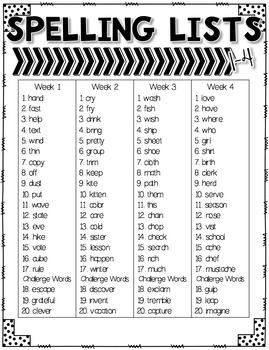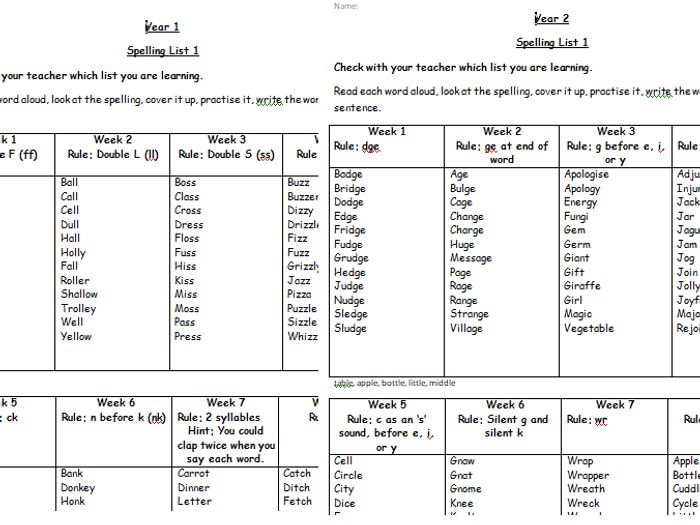
- #Spelling 1 2 how to
- #Spelling 1 2 free
#Spelling 1 2 free
There are two types of morphemes – free morphemes and bound morphemes.įree morphemes are those that can stand alone as separate words (play as in playing, friend as in unfriendly).īound morphemes are not words themselves and cannot occur independently. The spelling of longer words requires students to identify and put together the necessary morphemes. Morphemic knowledge involves understanding how morphemes can be used to form words. Morphemes are the smallest parts of words that carry meaning. For more information about graphemes, see Even though some sounds can be represented by a variety of different letters or letter combinations, these are regular and fixed (Westwood, 2014).
trigraphs – three different letters representing a phoneme, igh as in night, dge as in judgeĮnglish orthography follows a highly regular system of patterns. consonant clusters, gl as in glow, scr as in scratch.  digraphs – two different letters representing a phoneme, sh as in sheep, ir as in bird. double consonant graphemes, bb as in bubble, ss as in miss. double letter graphemes, ee as in feet, oo as in book. single letter graphemes, b as in banana, c as in cat or city. A grapheme can comprise one or more letters. The 26 letters of the English language are used to represent the phonemes of words. Beginning writers will need to understand the alphabetic principle, that is, that spoken language can be recorded in written language by using alphabet letters (graphemes). To spell fluently, students also need to know the rules about how written letters are arranged in English. Orthographical knowledge is the awareness of the symbols (letters or groups of letters) used to represent the individual sounds of spoken language in written form. Another important part of phonological knowledge development is the ability to understand that sentences comprise words, and to hear and identify the separate words in sentences. In order to spell words, students use this phonological knowledge to segment each word into smaller units, such as syllables, phonemes or onset and rime, and accurately match these to appropriate letters or letter combinations (graphemes). As part of learning to spell, students need to develop phonological awareness, that is, the ability to hear, identify, and manipulate syllables, rhymes and individual sounds (phonemes) in spoken words. It is an important part of learning to write (and read). Phonological knowledge refers to knowledge about the sounds in language. etymological knowledge - knowledge of the origins of words (Oakley & Fellowes, 2016, p.6). morphemic knowledge - knowledge of the smallest parts of words that carry meaning. orthographical knowledge - knowledge of the system of written symbols used to represent spoken language. phonological knowledge - knowledge of the sound structure of language. Spelling requires students to draw on a range of knowledge about the English language.
digraphs – two different letters representing a phoneme, sh as in sheep, ir as in bird. double consonant graphemes, bb as in bubble, ss as in miss. double letter graphemes, ee as in feet, oo as in book. single letter graphemes, b as in banana, c as in cat or city. A grapheme can comprise one or more letters. The 26 letters of the English language are used to represent the phonemes of words. Beginning writers will need to understand the alphabetic principle, that is, that spoken language can be recorded in written language by using alphabet letters (graphemes). To spell fluently, students also need to know the rules about how written letters are arranged in English. Orthographical knowledge is the awareness of the symbols (letters or groups of letters) used to represent the individual sounds of spoken language in written form. Another important part of phonological knowledge development is the ability to understand that sentences comprise words, and to hear and identify the separate words in sentences. In order to spell words, students use this phonological knowledge to segment each word into smaller units, such as syllables, phonemes or onset and rime, and accurately match these to appropriate letters or letter combinations (graphemes). As part of learning to spell, students need to develop phonological awareness, that is, the ability to hear, identify, and manipulate syllables, rhymes and individual sounds (phonemes) in spoken words. It is an important part of learning to write (and read). Phonological knowledge refers to knowledge about the sounds in language. etymological knowledge - knowledge of the origins of words (Oakley & Fellowes, 2016, p.6). morphemic knowledge - knowledge of the smallest parts of words that carry meaning. orthographical knowledge - knowledge of the system of written symbols used to represent spoken language. phonological knowledge - knowledge of the sound structure of language. Spelling requires students to draw on a range of knowledge about the English language. 
Good spelling is also a social expectation and contributes to clear communication of a written message. Learning is not a race, be sure to take it easy, just like how numbers started from one and slowly made its way to 20.Spelling is a complex skill and an important part of writing. Learning takes time, nobody is always good in their first try, that’s why you have to start with something small and make it up to the bigger numbers with more letters to spell. Going one number spelling at a time, and once you have mastered all the spelling of each number from one to twenty, then that is the time that you can level up to numbers above twenty. Have a goal first, for example, have 20 as your goal for starters. You don’t need to learn them all at once, you can start with 1 – one, 2 – two, and so on.
#Spelling 1 2 how to
Knowing how to spell will give you an advantage when it comes to mathematics and other aspects in life. Spelling numbers from one to twenty is a basic knowledge and therefore must be known to everyone. You see, numbers are important, and their spellings matter. And if you have high grades, then you’re smart. If you have a lot of food, then you’ll never go hungry. If you have a lot of money, then you’re rich. The importance of numbers can be seen in money, food, and even in school. Numbers are a daily part of our lives we encounter them every step of the way. Snakes and ladders spelling numbers 1 to 20 game Number spelling game one to 20






 0 kommentar(er)
0 kommentar(er)
